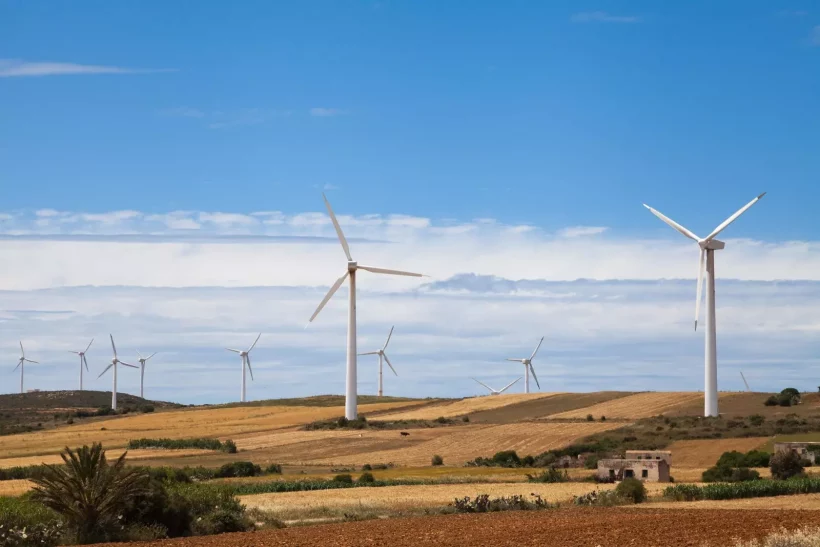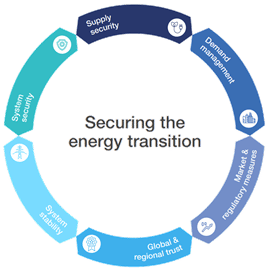
Geneva, Switzerland, 12 January 2023 – The current energy crisis is driving inflation, slowing economic growth and creating social turmoil. We cannot afford to compound this crisis by allowing our responses to derail the energy transition. Yet short-term backward steps, such as increasing production of electricity from coal or broad-based consumption subsidies, risk doing just that.
A comprehensive reappraisal of energy systems is urgently needed, to prioritize solutions that simultaneously enhance energy security while accelerating the transition towards a just, low-carbon future. A new report, Securing the Energy Transition, published today by the World Economic Forum, proposes a comprehensive framework that provides a strategic blueprint to make security and resilience the backbone of a transitioing energy system, and 10 actions to align current interventions to address the energy crisis with long term energy transition goals.
“The energy crisis has brought energy security to the forefront of political and corporate agendas and prompted the need to develop responses that are adapted to how the energy system has evolved and to where it needs to transition,” said Roberto Bocca, Head of Shaping the Future of Energy, Materials and Infrastructure, World Economic Forum. “What is now a global crisis is a real opportunity to steer a more direct course towards a secure, sustainable and affordable energy future for everyone. This requires radical collaboration and a pragmatic approach to confront the complexities of the energy transition with immediate actions.”
Energy systems in transition face opportunities and risks from changing energy markets as well as from increasingly decentralized, digitalized, decarbonized and distributed energy supplies – which necessitates a re-evaluation of energy security in the emerging context. The report proposes a comprehensive framework for a secure energy system to guide countries and policy-makers to plan strategic actions, policies and regulations.

The near-term consequences of the energy crisis require immediate interventions – but these responses offer a valuable opportunity to accelerate progress towards a future for energy that is both secure and sustainable.
“The energy crisis impacts us all and the world cannot afford short-term fixes to the energy crisis which could increase future risks to both the climate and energy equity. The good news is that the crisis offers an opportunity for interventions that balance energy security with an effective low-carbon transition,” said Espen Mehlum, Head of Energy, Material and Infrastructure Program, World Economic Forum
The report proposes 10 immediate actions organized under four key themes:
Supply reinforcements
- Prioritize supply from renewable energy and constrain fossil fuel reinforcements to committed emission reduction targets – the IEA recommends $5 of investment in renewables for every $1 spent on new fossil fuel production.
- Advocate for a diversified energy and trade matrix – an over-concentration on a few energy suppliers was a key contributor to the current energy crisis.
- Address methane leakage from hydrocarbon supply chains – the climate benefits of natural gas are no better than coal if more than 3.4% of it escapes before combustion, but some fields have fugitive emission rates of 6% or more.
Demand management
- Maximize electrification and energy efficiency to alleviate and decarbonize demand – high gas prices in the near term will enhance the economics of investing in efficiencies and electrifying industries and home heating.
- Nudge social behaviour towards responsible energy consumption – globally the top 10% of households consume roughly 20 times more energy than the bottom 10%, but targeted public information and incentives could encourage top-end consumers to become more efficient.
Fiscal measures and investments
- Leverage excess profits from energy market to bridge clean energy investment gap – to reach net zero, investments in clean energy needs significant increase. Immediate deployment that can be achieved also through leveraging the extra profits – estimated in 4 trillions- that have been realised in some parts of the energy markets.
- Target vulnerable consumers with fiscal measures, without interfering in market signals – government incentives and subsidies to improve energy affordability should avoid distorting market signals, be more targeted, and incentivise continued investment by private sector and efficient consumption.
- Provide reliable signals to investors in energy supply and infrastructure – clear guidance is needed from policy-makers on the outlook for gas demand alongside acceleration of low-carbon sources.
Co-ordination and long-term strategy
- Co-ordinate with regional peers to maximize efficiency and minimize costs – for example, joint procurement and co-ordinateed new LNG import facility installation to prevent overcapacity and stranded assets.
- Revisit energy security strategies considering shifting technology and fuel landscape – this crisis provides an opportunity for countries to comprehensively redesign their approaches to energy security.
While governments are primarily responsible for ensuring their countries’ energy security, addressing this crisis in a sustainable manner will require exceptional levels of engagement from and collaboration between governments, companies, international organizations and individual consumers.